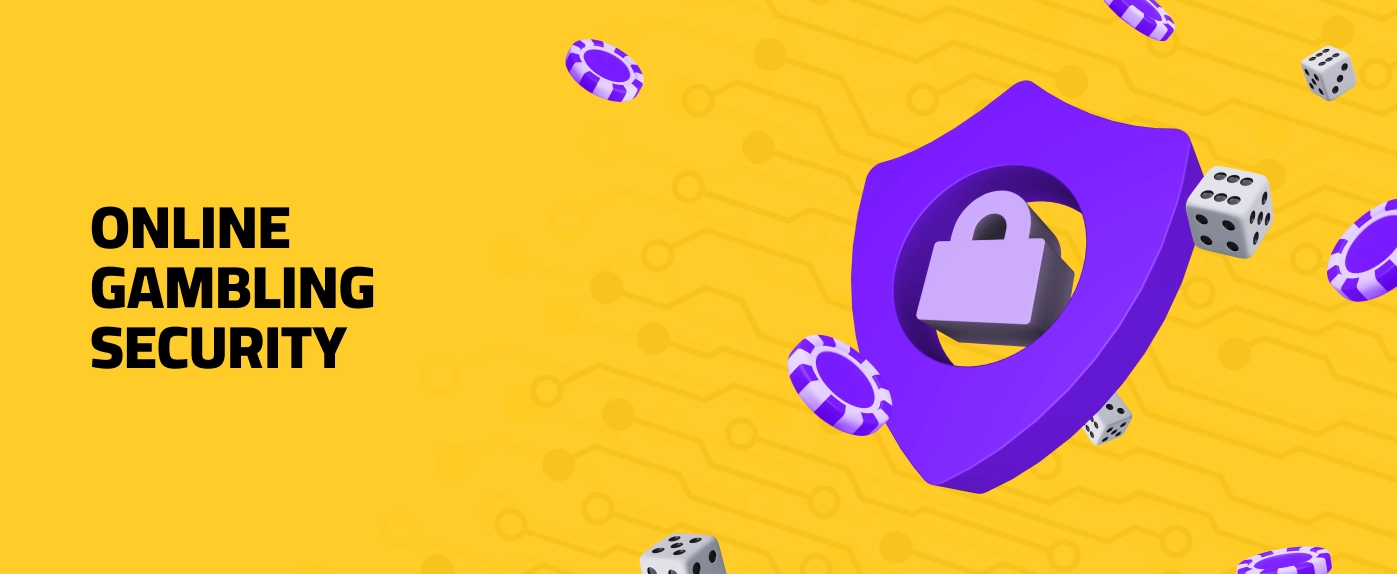
Online Gambling Security: The Best Tips for Gaming Operators
Considering the fast pace at which the iGaming industry is progressing, it’s not just bringing exciting new milestones and breakthroughs but also introducing a set of previously unknown challenges. One of the core issues that still persists is online gambling security.
Whether you’re an iGaming provider or a regular gambler, you’re exposed to a certain degree of cybersecurity risks. Fortunately, this problem has been around long enough to evolve into a competitive advantage, motivating industry players to invest heavily in keeping their systems and data secure — allowing users to enjoy their sessions in a safe environment.
Understanding Online Gambling Security Threats
While online gambling security issues share similar patterns, attacks can come from different sources. To help keep your money and sensitive personal information safe, we’ve provided a breakdown of the most common types of cybersecurity threats.
| Type of cybersecurity threat | Common causes/methods | Prevention/reduction solutions |
|---|---|---|
| Data breaches | Weak protection of password storage, outdated software | End-to-end encryption to transmitted and stored data, multi-factor authentication (MFA), regular security audits |
| DDoS attacks | Illegal bots flooding a website’s traffic (especially during high/peak website visits) | DDoS mitigation services (e.g. Cloudflare), traffic load balancing (sending different users to multiple servers), geo-distributed server architecture |
| Fraud | Stolen personal information, fake ID documents, abuse of promotions, account sharing | KYC and AML procedures, AI-backed fraud detection service (detecting suspicious behavior of a user), transaction monitoring |
| Regulatory risks | Poor user data maintenance, weak KYC checks, lack of compliance experts | Following strict regulatory compliance processes, staff training, partnering with compliance solution providers (e.g. Sumsub) |
| Malware and phishing | Scam calls/emails, “infected” ads/links/QR codes | Email authentication systems, anti-phishing training for staff and users |
| API vulnerabilities | APIs with weak authentication, lack of login attempt control, exposure to backend code | Requiring users to complete CAPTCHA, monitoring suspicious activity, IP whitelisting (blocking unknown connections), API gateway tools |
Best tips for online gambling safety
For many users, the question “Is gambling online safe?” remains central, especially when it comes to protecting personal data and avoiding fraud. As we continue exploring the topic, the following sections will offer guidance on key cybersecurity practices that help players and platforms stay secure at all times.
Players’ Sensitive Information Protection
Before sharing your personal data with an online casino, we strongly recommend making sure the platform follows key cybersecurity measures. Most platforms will make it obvious how secure their website is and how seriously they treat customers’ information, which greatly contributes to building immediate trust with players.
To check if a casino indeed complies with relevant safety protocols, look for the following:
- Data Encryption: Integrating this technology significantly boosts the safety of users’ personal and payment details by turning them into a cipher. Even if the data is stolen, hackers won’t be able to use it.
- Two-Factor Authentication: Adds an extra layer of protection during login, allowing users maintain full control over their accounts.
- Regular Software Updates: Reflects the casino brand’s commitment to maintaining strong and relevant security standards for its users.
- Secure Payment Methods: Reputable casinos offer licensed and trusted payment options for both deposits and withdrawals.
- KYC and Verification Procedures: Requiring players to go through identity checks indicates the platform’s willingness to maintain the website fair for every visitor.
Countering Cybercriminals
In recent years, cyberattacks have become one of the most serious threats to online gambling security. According to a 2020 survey by the UK’s Department of Culture and Media Services, 55% of online gambling businesses reported experiencing a cyber incident within the past year. These attacks don’t just put player data at risk — they often lead to financial losses and seriously harm the reputation of the casino or betting site. Since platforms handle thousands of transactions daily and rely on a complex system of casino algorithms, even a small disruption can quickly create much bigger problems. That’s why most online gambling operators are actively strengthening their safety measures, by applying the following tools:
- Web Application Firewall (WAF): Monitors incoming traffic and prevents harmful requests, like hack attempts or fake logins, before they can cause trouble.
- Endpoint Detection and Response (EDR): Keeps an eye out for devices, like laptops or smartphones, and quickly identifies and reports suspicious behaviour.
- Patch Management: Keeping the software and the rest of the systems updated on a regular basis to fix security gaps that hackers commonly use.
- Secure Configuration: Making sure the system is running safely from the very beginning and tackling potential issues by getting rid of unnecessary features.
- Password Policy: Making sure everyone uses strong, unique passwords and regularly changes them to avoid account hacks.
- User Access Control: Identifying exactly who can access different website areas so employees only have permissions needed for their specific tasks.
- DDoS Protection Services: Blocking heavy floods of fake traffic, preventing cybercriminals from shutting down your website during peak times.
- Real-Time Threat Monitoring: Watching out for suspicious activities or sudden traffic spikes to catch problems the moment they emerge.
- Multi-Factor Authentication (MFA): Providing an extra step during sign in procedures (like a code sent to your phone), so accounts stay protected at all times (even in cases if a password gets stolen).
- IP Whitelisting for Admin Access: Allowing only specific, trusted networks to access sensitive admin areas, making sure outsiders can’t break in.
- Network Segmentation: Dividing your system into separate parts (like payment processing, player databases, and admin panels) so if one part gets hacked, others stay safe.
- Staff Security Training: Teaching your team about common cyber threats like phishing and fraud, reducing the chance of mistakes that lead to breaches.
Fraud and Money Laundering: Everyday Risks for Operators
Fraud and money laundering are not rare exceptions in online gambling — they are regular threats that operators have to handle on a daily basis. Because money moves fast and anonymously online, the risk of abuse is more than real. Criminals try to use casinos to clean funds or exploit weak identity checks to bypass restrictions. That’s why online gambling operators are under constant pressure to apply proper anti-money laundering (AML) measures and keep their platforms clean.
One of the first layers of defence is Know Your Customer (KYC). Every player must submit identity details (like an ID, a utility bill, real-time selfie, etc.) before making real-money transactions. This helps confirm that users are legitimate and comply with set policies.
Another key step is to monitor transactions. Gambling platforms use internal systems to flag anything unusual — like sudden high deposits, frequent withdrawals, or multiple accounts linked to the same user.
AML background checks also play a role. These are used to screen users against sanctions lists or check if the source of funds looks suspicious.
To support all this, operators rely on secure casino payment methods that follow Payment Card Industry (PCI) standards. That includes card encryption and fraud alerts — crucial tools for stopping financial abuse before it escalates.
Taken together, these measures help gambling businesses stay compliant, protect their players, and avoid becoming a tool for financial crime.
Building Trust and Ensuring Reputation
Trust isn’t something players give away easily — it has to be earned. Gamblers need to know that the casino brand they have chosen plays fair and takes security seriously. That means personal data stays safe, and the rules are clear from the start. Fast payouts, visible licensing, and a clear commitment to fair play help players feel valued. These steps aren’t just about compliance — they are essential for long-term player safety and healthy business growth. Without trust, even the most advanced platform won’t keep players coming back.
Keeping the Game Fair for Everyone
Fair play lies at the core of any gambling discipline, bringing out the true spirit of the game. And it can’t be just promised — it must be shown and proven. That is exactly where tools like the “provable fairness” feature come in. Methods like these allow users to rest assured, knowing that every outcome they encounter in online casinos is truly random and can’t be manipulated.
Another crucial factor is how game providers connect their systems to casino platforms. Trustworthy online casino API integrations facilitate an environment where each spin result or bet outcome comes directly from licensed developers. Once again, it’s about trust — delivering a safe and fair environment is the key to motivating players to actually come back.
Staying Compliant
The online gambling industry is tightly regulated. Operators must follow strict laws and regulations to stay compliant to keep their platforms running. Meeting regulatory compliance helps operators stay legal and keep building trust.
Only because of these regulatory requirements can a platform protect players, develop fair play conditions, and ensure operational transparency. That includes everything from responsible gambling tools to strict security measures for data protection and transaction handling.
iGaming industry compliance has become so strict over the years that ignoring it is nearly impossible. Owning a successful online casino requires a lot of attention to detail — otherwise, platforms risk facing large fines, revoked licenses, or being shut down entirely.
When Security Fails, Players Pay the Price
Security in online gambling isn’t just a technical issue — it’s a people problem too. When online casino security slips, it’s the players who feel the consequences first. And the damage can go well beyond a bad user experience.
Here’s what can happen when things go wrong:
- Identity Theft: When personal data leaks, scammers can use it to open accounts or commit fraud (usually in someone else’s name).
- Financial Loss: If payment systems aren’t secured properly, players may find their funds withdrawn without consent. You can forget about getting your money back.
- Unfair Gameplay: Broken or tampered systems can skew the odds. What should be a chance becomes rigged. In most cases, players are last to know.
- Targeted Phishing: Once user emails or details are exposed, it opens the door to fake messages, scam links, and data-harvesting traps.
- Account Takeovers: Weak login systems make it easier for hackers to slip in, lock players out, and drain accounts.
- Game Manipulation: Without proper online casino API integration, there’s no guarantee that results come from the game developer — outcomes can be faked.
Players don’t see security — but they feel when it’s missing. For online casinos, that means it has to be part of the experience from the ground up, not something which is added later.
Third-Party Vendors in iGaming: Available Solutions and Weak Spots
Running an online gambling platform is highly demanding — from meeting security standards to delivering a diverse game library and payment processing. As a result, many turn to third-party vendors to strengthen their infrastructure and handle specific needs, especially when scaling fast and staying secure.
Vendors now offer some of the most advanced solutions for online gaming and gambling. These include biometric logins and multi-factor authentication, which help verify players more reliably. Others bring in AI and machine learning to detect fraud patterns or predict risky behaviour before it escalates. Blockchain is also sometimes used to log transactions or online casino game outcomes transparently. And when it comes to protecting platforms from overload or exploitation, tools like Web Application and API Protection (WAAP) step in to sort out harmful requests and suspicious activity.
Some vendors even focus on compliance, offering regulatory software that tracks license requirements and flags irregularities, saving time and preventing violations.
Still, vendors also carry a big part of the security load. If they overlook critical security features or misconfigure systems, it doesn’t stay a vendor problem for long. Players may face data leaks or account failures, while the casino risks reputational damage that’s hard to recover from.
Final Thoughts & Key Takeaways
Online gambling comes with real risks, and cutting corners on security only makes them worse. Here’s what operators should keep in mind to run a safe and trusted platform:
- Use encrypted systems to protect your information and funds from leaks.
- Set up two-factor or biometric logins to protect user accounts.
- Run regular updates to patch weak spots in your software.
- Monitor all transactions to catch fraud before it spreads.
- Stick to strict KYC rules to stop fake accounts.
- Choose payment tools that meet PCI standards.
- Train your team to spot phishing and red flags early.
- Work only with vendors who follow proper security practices and prioritise online gambling security.
- Keep your platform compliant with licensing laws and data rules.
- Don’t just promise fair play — prove it with transparent game systems.





